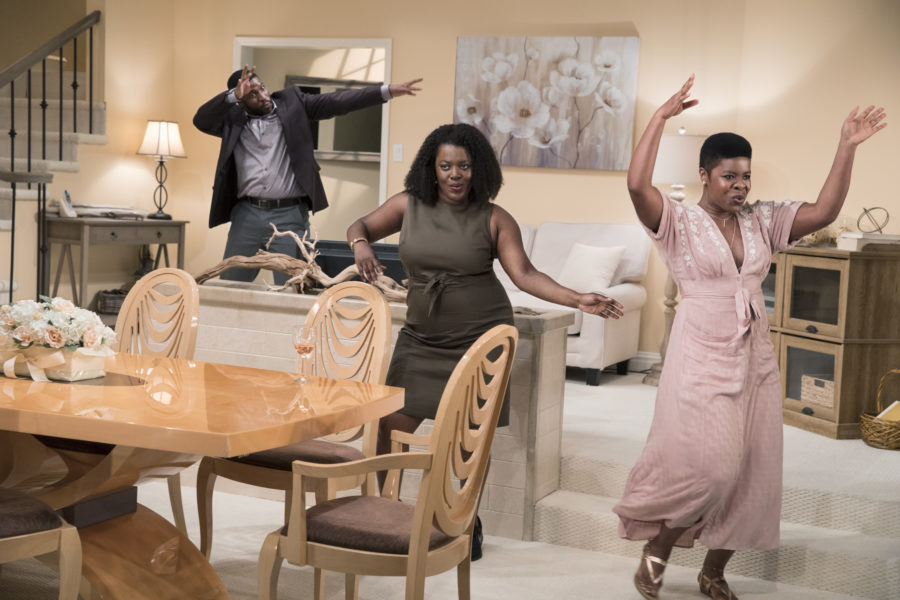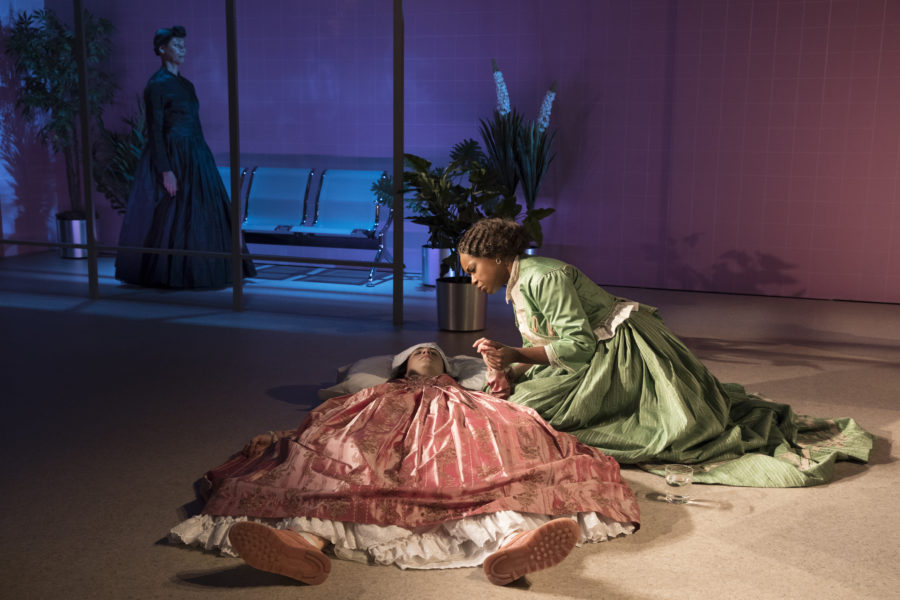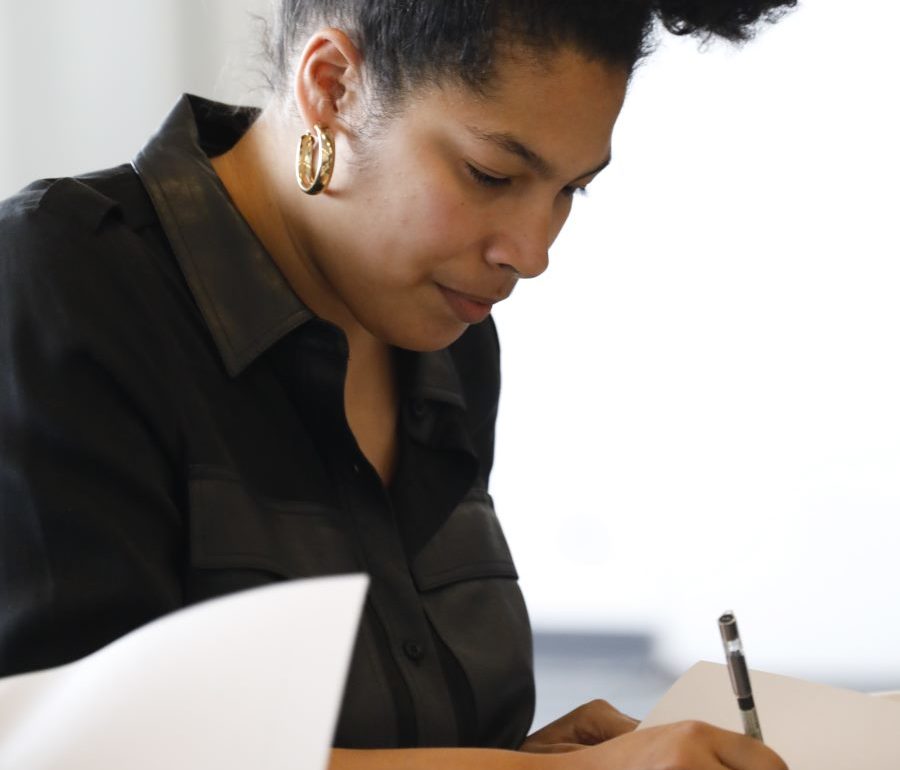The first Jackie Sibblies Drury play I saw, just after I’d moved to New York City in 2012, had a title that sounded like a dissertation: We Are Proud to Present a Presentation About the Herero of Namibia, Formerly Known as Southwest Africa, From the German Sudwestafrika, Between the Years 1884–1915. Up to that point, I had associated plays with linear, static pieces of work, usually with a couch, always about white people with a terrible secret revealed in the last act.
Perhaps that’s why, seven years later, I don’t remember much of what I saw in 2012, but I remember We Are Proud to Present. Drury had done things onstage that I, a 24-year-old theatre newbie, had never seen before. In the play, a group of actors are trying to make a play about the genocide of the African Herero tribe by German colonists, but they’re at a disadvantage because the only written records were made by the Germans. “All we are doing is hearing the white version of the story over and over,” says a character in the play, which used metatheatricality and fragmentation in service of topics that few theatremakers were tackling at the time: the legacy of white violence against Black people, racial stereotyping, whose eyes we get to see history from, and who has the right to tell these narratives of pain and oppression. Oh, and cultural appropriation, before that term was a widely contested buzzword.
Not that Drury herself was using those words when she was writing We Are Proud to Present. “I don’t know if I had all the terminology that we have now at my own disposal,” she admitted when we spoke recently, after rehearsal for a remount of her play Fairview, which recently won her the Pulitzer Prize for Drama. Though We Are Proud to Present was written in 2010, while Drury was still in graduate school, what it talks about is still so heated and unresolved that it could have been written today. And if it seems lately there’s been a surfeit of Black playwrights tackling race onstage in formally inventive ways, it can be partly traced to Drury’s work at the beginning of the decade.
Drury has mixed feelings about the play’s continuing relevance. “It feels nice to have written something vaguely thoughtful enough to still be part of a conversation that’s continuing,” she said with her characteristic modesty, adding that “it’s weird that there’ve been different waves of realization of how far we’ve come and how much the conversation around identity has changed and shifted and become more complex, and more combative at the same time. That feels crazy.”
Seven years later, Drury is continuing that conversation with Fairview, which premiered at Soho Rep in lower Manhattan last year, was extended three times, and earned Drury both the Susan Smith Blackburn Award and Pulitzer. It also made best-of-2018 lists at The New York Times, New York, Time, and this one.
This time Drury turns her attention on the white gaze. Fairview begins much like any play you might find in midtown Manhattan: With a couch and a family getting ready for an event. If this were any other playwright or any other venue, we might be treated to a work where secrets are revealed, tears are shed, and monologues recited. And there would be the unfortunate and seldom examined power and racial dynamics of having a Black cast perform for an audience of predominantly white patrons.
If it is an unfortunate reality that the typical theatre audience is white and well-heeled, Fairview takes that unfortunate unequal reality and makes it the point of the play, and satirizes naturalistic dramas in the process. While the actors start the play performing for the audience, toward the end (slight spoiler alert), the fourth wall is broken and the audience is asked to perform for the performers, in essence (and for each other). The Soho Rep production is about to be remounted at Polonsky Shakespeare Center, a Brooklyn theatre three times the size of Soho Rep (June 2-July 28). The play will then go on to new productions at Woolly Mammoth Theatre in D.C. (Sept. 9-Oct. 6) and the Young Vic in London (2020).
Fairview asks its audience to participate, but some refuse, or have negative reactions to that request. For her part, Drury is slightly amused that something like Fairview has rankled audiences so much that the New York Times ran an article about how “uncomfortable” it is. “It’s curious to me that even a simple embodiment of a gesture toward dismantling white supremacy is so difficult for people to do,” she said circumspectly. “I’m not offended by it; it’s just what it is.”

Drury’s plays are bold and her writing so complex that they can make you feel slightly heady after watching. By contrast, Drury herself is down-to-earth; she’s six-foot-tall with a wide smile and a playful energy. As she talks, you can sense there’s a rigorous brain that’s constantly thinking and refining—she tends to pause mid-sentence to clarify or rephrase her thoughts. And then she’ll make a “that’s what she said” joke.
“I do like to think about serious things,” she admitted. “But I also like to make theatre, which I think is fundamentally something that’s supposed to be entertaining. And I like making dumb jokes. I feel like the dumbest joke helps you understand something that’s very complex and violent in a way that your brain is actually able to deal with it.” She cited Richard Pryor as an inspiration.
This sensibility informs several moments in Fairview, such as when one of the white characters speaks, with un-PC specificity, about wanting to be Black. “Don’t you think that once a person has enough money, their race just kind of disappears and they’re just rich?” he muses. “Like, if I’m going to be Black, I’d want to be a normal Black person, to like, have that experience, of like going to da club, you know?” To which another white character responds, “You’d just want to be Black so you could say the N-word.”
Occasionally when you’re watching a Drury play, you may find yourself laughing, then wondering if you’re supposed to, or allowed to. “It’s my favorite kind of laughter,” she said with delight. “The kind that feels like, Ugh, you’re not supposed to be doing it, or I can’t believe I’m laughing at this, or I hope that no one hears me laughing at this. I like to go to plays to feel stuff, and that is a way to deeply feel something.”
Director Sarah Benson, who directed Fairview and programmed two of Drury’s plays at Soho Rep, called Drury a consummate theatremaker. “One of the themes that threads through all her work is Otherness and creating structures that really theatricalize how we feel about other people and think about other people,” Benson explained. “She’s very, very much writing for the theatre.”
Drury grew up in Plainfield, N.J. The daughter of immigrants from Jamaica, she was raised by her mom and grandmother, grew up middle class, and went to private school. Though there are no artists in the family, the Sibblieses (Drury’s maiden name) would take trips to Manhattan to see Broadway shows; and on long car rides, Drury and her mom would sing along to the two-CD box set of Phantom of the Opera. “It does keep you awake, trying to sing fake opera in the car,” she said chuckling, then in a faux operatic voice, “‘In dreams he came to me….’”
When Drury said she wanted to be a playwright, while studying literature at Yale, her mom was supportive, if skeptical. “She was like, ‘I can’t pay for your entire life, so unless you figure out how to support yourself, you will have to live on the streets and not be able to eat anything,’” Drury recalled wryly, adding, “That was a justifiable concern.”
It was while in grad school at Brown that Drury wrote what would be her breakout play, We Are Proud to Present. Chosen out of 120 entries as the winner of the 2010 Ignition Festival, it secured her a production at Victory Gardens Theatre in Chicago. “When I started writing it in grad school, it was right after the 2008 election. It was this weird moment where Barack Obama was elected and everything thought, ‘We’re in a post-racial America,’” recalled Drury. “And I thought, ‘Oh no, we’re not! Demon! It’s not that easy!”
The Chicago production was reviewed in The New Yorker, then produced at Soho Rep, and Drury was suddenly a talent to watch. A production at Trinity Rep ensued the following year (Social Creatures, about a zombie apocalypse), and a flurry of commissions followed. But Drury, an admittedly slow writer (“I’m not exactly prolific”), tended to take her time.
So between productions, she took temp jobs, then eventually taught playwriting at Fordham University and now the Yale School of Drama. A steady income of playwriting prizes (including the $150,000 Windham Campbell Prize and the $40,000 Jerome Fellowship from the Lark playwrights center in New York City) helped provide her with something of an “endowment,” as she called it. “It makes me feel like I can make different choices,” she remarked. “Take your time, if things get bad, you have this cushion. I wish somehow every writer had this little savings cushion; it feels incredibly fortunate.” It also helps that she and her husband live in a “tiny apartment” in Brooklyn.
One thing this relative stability has done is give Drury time to marinate with her ideas. Though Drury had two world premieres in quick succession in 2018 and 2019 (Fairview and Marys Seacole at Lincoln Center Theater’s LCT3), she began writing both in 2015. Drury’s usual process begins when she’s inspired by an idea. For Fairview, she wanted to explore surveillance and the ways implicit bias informs how we watch other people. For Marys Seacole, the theme was care work and how Black women have historically been called upon to take care of white women and their families.
Drury describes her approach to writing as akin to throwing spaghetti against the wall to see what sticks. “It’s lots and lots of pages of notes, and short exchanges of text and some stage directions and some impressionistic gathering of things,” she explained. She’ll write enough to get 40 to 60 minutes worth of material to bring to a workshop. That part is key for her: hearing actors read the words and gathering feedback. It is only through rehearsal, she said, that “somehow you find a simple and direct but nuanced way of explaining something that you’ve been trying to figure out how to articulate. When you find those moments, then you’re like, ‘Yes! I found my ‘to be or not to be’!’”
Benson compared working on Fairview to creating a musical. “It’s sort of a secret musical and is very, very technically intense,” she said. Because the play includes dancing, gigantic props, and an immersive sound design (that we will not spoil here), stage timing is crucial. “It’s a very precise physical score,” said Benson, whom Drury credits (along with set designer Mimi Lien) as a cocreator of Fairview. At one point, all three women were reading the same book, Dark Matters by Simone Brown.
But her sense of collaboration is even broader than that. “Making space for a person who thinks about performance to create something specific to them within the experience of the play feels really important, for the directors, designers, actors, and audience,” explained Drury. “There has to be flexibility in a play because that’s part of the form of it to me.”
The way Drury constructs her plays, in short, is not a simple matter of crafting a linear narrative and letting it play out. With the material of Marys Seacole, for instance, which earned Drury an Obie—alongside her director Lileana Blain Cruz and actor Quincy Tyler Bernstine—a more traditional playwright might have written a bioplay. Marys Seacole is more ambitious and experimental than that: In its almost two-hour run time, the play shuttles back and forth in time, sometimes in the same monologue, between Mary Seacole, a British-Jamaican nurse who was a contemporary of Florence Nightingale, and Mary, a nurse working in present-day America. Bernstine played both Mary Seacole and the modern Mary.
Such intricate construction may have you believing (or fearing) that you’re in for a brain teaser. And then Drury will gut you with a line that’s moving and true, yet stated so simply and directly. In Marys Seacole, one character describes the working conditions in America for Black women: “You go there and they will make you work and mock you while you do it. You go there and they will not see you as human being with a soul and a morality and a vitality, they will see you as worse than a dog worse than a slave. At least for them slaves is property. Them need us but them nah want us.”
Bernstine, who also starred in We Are Proud to Present, said that balance between intellectual rigor and emotional resonance is what makes Drury’s work so powerful. “It’s an odd piece of work and it’s a powerful piece of work,” she said of Marys Seacole. “We so rarely see Mary Seacoles represented onstage. Jackie shines a light on people who don’t often get light shone on them.” Bernstine cites Marys Seacole as the hardest play she’s ever done in her almost 20 years in the business. Fittingly, she also recently earned a Lucille Lortel Award for her performance.

In the New York magazine review of Fairview, critic Sara Holdren wrote that it left her “grappling with the question this play inherently asks of whether I (straight, white, cis) should be writing about it at all.” But if white theatregoers are the majority of people watching Fairview, white critics have also been the majority of those writing about the play. Before we parted, I asked Drury what she hopes audiences of color gain from the play, which ends with a wish for white people to “make space” for people of color. The question made her pause.
“I guess I wanted people of color generally to be acknowledged, in a way that’s complicated,” she answered with a certain hesitance. As someone who, like me, has been in situations where she was the only person of color in the audience, Drury wanted the work to acknowledge audience members who are still seen as atypical. “I wanted them to receive a gesture that’s trying to alter the space to fit them rather than asking people of color to alter themselves to fit a space, which I feel like is the everyday norm,” she said, gaining assurance. “What is it like if situations altered to fit you rather than you having to alter yourself? It’s not something that people should have to ask for, and hopefully some people do feel empowered to ask for it. And I’m hoping to encourage that.”


